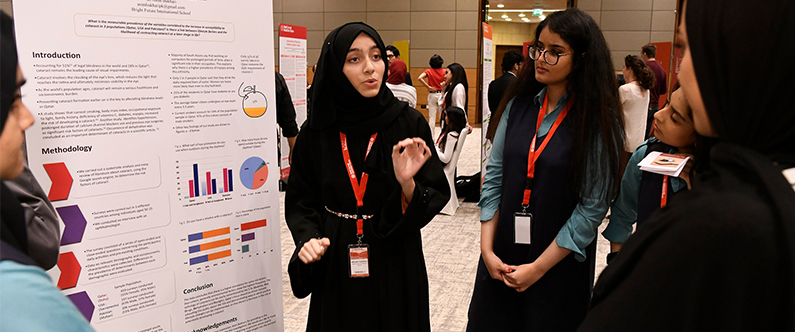High school students learn professional research skills from teaching faculty at WCM-Q
 The team from Bright Future International School who investigated the environmental risk factors of cataracts were ranked first by the judges.
The team from Bright Future International School who investigated the environmental risk factors of cataracts were ranked first by the judges.
Teams of students from high schools across Qatar went head-to-head as they presented research posters to a panel of experts.
The High School Research Competition was organized by the Student Recruitment and Outreach Office of Weill Cornell Medicine – Qatar (WCM-Q) to encourage teenagers to explore the field of medicine and to use professional scientific research methods. It was also designed to offer them a platform to showcase both their knowledge and their concerns.
Twenty-one teams from both private and independent high schools took part in the contest, presenting about themes tied to the United Nations’ Sustainable Development Goals of ensuring healthy lives; ensuring access to water and sanitation; making cities inclusive and safe; and ensuring sustainable consumption and production.
Research subjects tackled by the students included: ‘The effect of air pollution on the prevalence of respiratory diseases in Qatar’, which was studied by a team from Bright Future International School; ‘Elderly and their mental health’, by a team from Sherborne Qatar; and ‘Causes of dental decay among children in Qatar’ by a team of five students from Michael E, Debakey High School-Qatar.
Dr. Rachid Bendriss, assistant dean for student recruitment, outreach and foundation programs at WCM-Q, said the standard of research was very high.
He said: “It has been truly gratifying to read the research posters that have been presented here today because what is obvious is that the students involved have employed true research methodology.

“Science, technology and medicine are all areas in which Qatar needs to build research capacity and by encouraging students to become involved and take an interest in these subjects before they go to university, we can help them to make informed choices about their future careers. It would, of course, be wonderful if all those here today decided they wanted a career in medicine or biomedical research, but our real aim is to simply instill a love of science and research.
“What is also interesting, is that the posters all examine issues that are relevant to the lives of everyone living in Qatar today. Rather than the research being esoteric and remote, conducted in a sealed laboratory, the studies these students have performed all have an immediacy to which everyone can relate.”
Each research team was provided with the help of a mentor from WCM-Q, who helped guide their research, ensuring they were asking and answering the relevant questions, and providing expertise on research methods and the most effective means of presenting their findings to a wider audience. The mentors were composed of faculty members and the teaching specialists who teach in the premedical curriculum of the medical program.
The posters were then judged by a panel of 10 professional scientists from WCM-Q’s Division of Research, and the Qatar Biomedical Research Institute.
Year 13 student Ramsha Yousaf, from Bright Future International School, was part of the team that investigated the environmental and behavioral risk factors of cataracts.
Ramsha said: “We read up on the literature and then went out and surveyed people about the risk factors. For example, we asked them how many hours they spend in the sun each day, and what kind of eye protection they use. Cataracts are very common in older populations, so we wanted to know about whether habits and behaviors you have at a young age influence whether you get cataracts when you’re older.”
Ramsha said her group concluded that there was a risk associated with cataracts and these risks could be summed up as the five Ds: daylight, diabetes, diet, drugs and dehydration.”

During the competition, the top three ranking teams were announced. The Bright Future International School team who investigated the prevalence of behavioral and environmental determinants of cataracts, came out first. The team is comprised of the teacher Mr. Asim Bukhari and the students: Momina Khashi, Maryam Sulaiman, Najwa Amir, Ramsha Yousaf and Zahida Bibi. The second ranking team was that of Ali Bin Jassim Bin Mohamed Al Thani School researching about germs-free central air conditioning using UV-c. In the third place, came the Lebanese School of Qatar researching about recycling and kitchen waste.
Dr. Elie Sayeh, who helped lead the team from Lebanese School of Qatar, said the competition had been hugely valuable to the students.
Dr. Sayeh said: “They now know how to conduct research; they know the correct terminology to use, they know how to present the information using graphs, and they have improved their critical thinking.”
Dr. Sayeh said their study had examined the creation of biofuel from waste cooking oil, in order to reduce air pollutants from petrol engines.
All the teams were given the opportunity to go through to the next round, where they will present their posters at the annual High School Medical Conference on November 23 at Qatar National Convention Centre, where the top team will be announced.